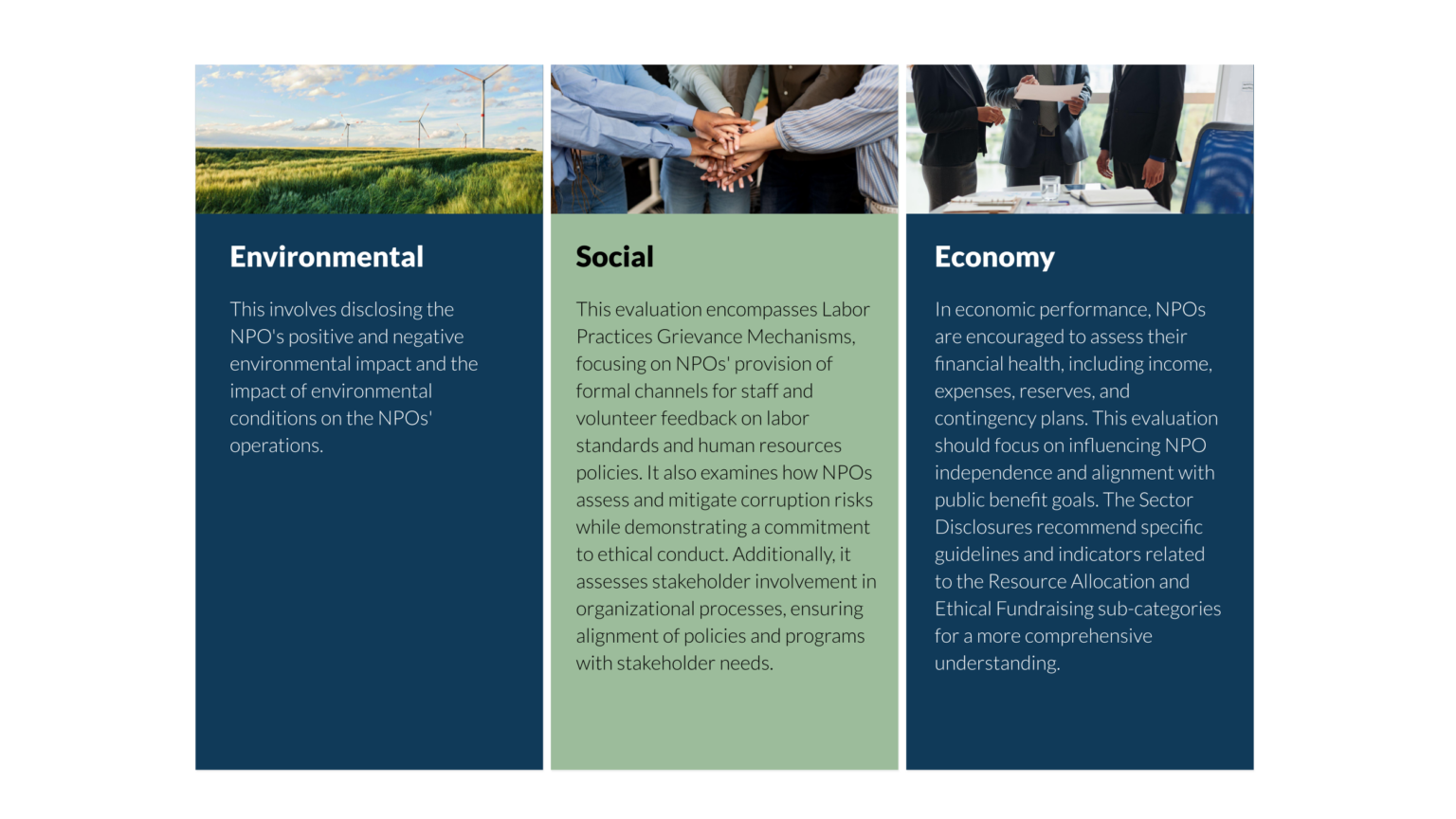Environmental, Social, and Governance (ESG) principles have traditionally been associated with for-profit businesses. However, in recent years, there has been a growing recognition of ESG’s relevance for nonprofit organizations (NPOs) as well.
Why ESG Matters for NPOs
For NPOs, ESG can be a strategic opportunity. As businesses and investors become more ESG-focused, they will be more selective in choosing NPO partners. NPOs with strong governance frameworks and clearly defined ESG practices will be seen as more trustworthy and impactful.
ESG reporting also plays a role in enhancing transparency and accountability for NPOs, which can align well with your mission and reputation. Since following reporting standards also allows NPOs to be held to the same expectations as other sectors, it can also be seen as a way to strengthen your legitimacy and credibility. Internally, ESG reporting can also help focus your NPO constructively on self-assessment, measuring your impact, and continuously improving your practices.
ESG in Day-To-Day Operations
Some NPOs are already integrating ESG considerations into their day-to-day operations. Here are some ways they are doing this:
• Aligning mission and action: By their nature, NPOs address social or environmental issues. Integrating ESG ensures your organization’s business practices directly support your goals. For example, an environmental NPO might adopt sustainable practices in its offices, like using recycled paper or energy-efficient appliances.
• Proactive risk management: Thinking through ESG metrics helps NPOs identify and mitigate potential risks. This includes reputational risks tied to environmental practices, social justice concerns, or even regulatory compliance. Strong ESG practices can make your NPO more resilient.
• Boosting efficiency: Sustainable operations can lead to cost savings. This could mean reducing energy consumption, minimizing waste, or implementing a recycling program. These practices not only benefit the environment but also free up resources that NPOs can then direct towards the core mission.
• Building trust with stakeholders: A strong ESG commitment can increase donor and grantor confidence in your organization. Being transparent about your ESG practices fosters trust and credibility, leading to more fundraising opportunities and greater community involvement.
• Strengthening governance: Clear policies, procedures, and reporting mechanisms around ESG enhance the smooth running of your organization and provide greater transparency and accountability. Demonstrating strong governance makes your organization more efficient and also improves stakeholder trust and public support for your mission.
• Ensuring long-term viability: By embracing ESG, NPOs become more adaptable and sustainable in the long run. Strong ESG practices can help position your organization to navigate future challenges and continue delivering on your mission.
Navigating Guidance and Frameworks
Several frameworks have been developed to guide ESG reporting. While these tend to be aimed at the for-profit sector, they can still be valuable resources for NPOs.
• Global Reporting Initiative (GRI): GRI offers general sustainability reporting guidelines that NPOs can adapt. These guidelines cover strategy, organizational profile, material aspects, stakeholder engagement, and more. The GRI website also provides implementation guidance.
• GRI Sector Disclosure G4 for NGOs: This GRI guidance specifically addresses reporting for NPOs. It recommends focusing on disclosures most relevant to the NPO’s mission and activities.
The guidance suggests that specific standard disclosures per category should only be reported if they have been identified as material, in addition to the general standard disclosures mentioned.

• Task Force on Climate-related Financial Disclosures (TCFD): NPOs can use the TCFD framework to improve their reporting on climate-related risks and opportunities. TCFD offers a structured approach to assessing and communicating climate risks and opportunities.
• Carbon Disclosure Project (CDP): The CDP platform encourages organizations to disclose environmental impacts, risks, and opportunities. While often used by corporations, it is also a valuable tool for NPOs seeking to be more environmentally transparent.
Industry-Specific Guidance
As non-profit organizations (NPOs) operate across various sectors, each catering to different societal needs, specific disclosure requirements are necessary, differing from the standard disclosures for the for-profit industry. The Sustainability Accounting Standards Board (SASB) delineates detailed requirements per sector, such as healthcare, education, home builders and more. For instance, in healthcare, additional disclosures focus on patient privacy, electronic health records, and quality of care, also necessitating qualitative descriptions of policies and practices for securing personal health data and quantitative data on data breaches and patient readmissions. Similarly, education sector disclosures cover the quality of education and gainful employment, mandating disclosure of graduation and job placement rates. Furthermore, the home-building sector demands disclosures on the community impacts of new developments, encompassing details such as the total number of controlled lots and delivered homes. These tailored requirements reflect the unique operational landscapes and stakeholder interests of NPOs in various sectors that are not typically seen in the same sectors in the for-profit industry.
We would also suggest following other NPOs that have already begun integrating ESG reporting into their work. For example, the American Red Cross has published a comprehensive ESG report that aligns with GRI standards and sets a baseline for the Red Cross to measure future progress.
Currently, NPOs are free to tailor the forms and content of reporting as long as they meet the minimum requirements of the standard they opt to use and disclose only credible and factual information.
ESG is no longer just a concern for for-profit businesses; it is becoming increasingly important for NPOs. By embracing ESG principles, NPOs can enhance transparency, strengthen stakeholder confidence, improve operational efficiency, and position themselves for long-term success.
How Scrubbed Can Help
At Scrubbed, we are passionate about helping you grow your nonprofit mission. Our highly trained professionals on Nonprofit and ESG complexities are staying updated with the emerging industry norms, best practices, and regulatory requirements affecting your organization, such as the concept of ESG, to ensure that we address your current and future needs. We can help educate your Board, Management, and Employees on global and regional ESG reporting nuances, prepare sustainability reports, and help address risks and seize opportunities in the sustainability space.
Beyond ESG, we can help streamline your processes, track your spending, and provide accurate reporting in line with your 501(c)3 status. With clear financial records, you have greater visibility into donor details, cash disbursements, and vital KPIs like how much you spend to raise each dollar donated.
We can help prepare you for stress-free federal or state audits, provide essential documentation for board meetings, and generally take some of the hard work of managing nonprofit finances off your plate.
Learn more or contact us to see how we can help your nonprofit thrive.
Disclaimer: The information contained herein is general and is not intended to address the circumstances of any particular individual or entity. It is not intended to be relied upon as accounting, tax, or other professional services. Please refer to your advisors for specific advice. Although we endeavor to provide accurate and timely information, there can be no guarantee that such information is accurate as of the date it is received or will continue to be accurate. No one should act upon such information without appropriate professional advice after a thorough examination of the particular situation.
*Special thanks to Nizza Francheska San Pedro for her valuable contribution to this article.





